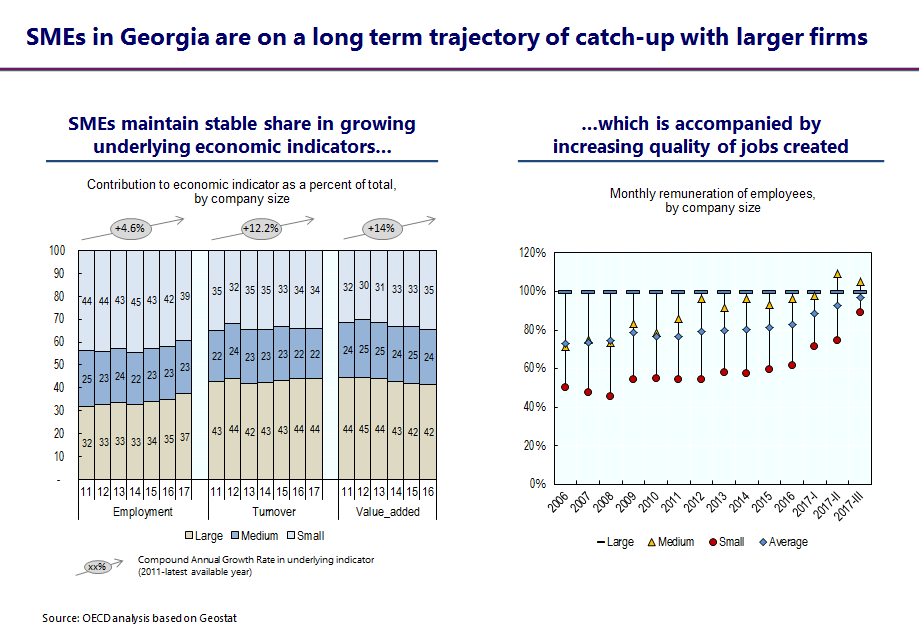With the advice of the OECD as part of the EU4Business initiative, Georgia has built a comprehensive set of policies, institutions and support programmes that make it stand out as a reference point in the Eastern Partnership for impactful and coherent policymaking for small and medium enterprises.
Following the wave of liberalisations and investment-friendly reforms of the early 2000s, Georgia progressively realised that more attention should be paid to develop entrepreneurship and build a competitive domestic SME sector able to create new jobs and drive the future growth of the economy.
In 2015, the Ministry of Economy and Sustainable Development embarked on an ambitious exercise to develop an overarching policy framework guiding government action to create a better business environment for SMEs and tackle the market failures that typically make it harder for small entrepreneurs to start, run and grow their business. With the support of the OECD as part of the EU4Business initiative, and inspired by international good practice, the government of Georgia engaged in a series of thematic workshops in consultation with the private sector to identify policy challenges and develop concrete measures for legislative and executive action to support SMEs.
These steps led to the adoption of Georgia's SME Development Strategy 2016-2020, the multi-year government strategy with the stated objective to support the development and economic role of small and medium enterprises. The strategy identifies 33 priority actions to be taken in important areas for SME development, such as improving legislation, institutional framework, operational environment, as well as improving access to finance, developing entrepreneurial skills, broadening internationalisation, and supporting innovation activities. The European Union is currently providing substantial financial assistance to the government of Georgia through direct budget support to advance in the implementation of the SME Strategy.
While designing its SME Strategy, Georgia has also been aware that strong policies require strong institutions to implement them. The creation of Enterprise Georgia and Georgia's Innovation and Technology Agency (GITA) has catalysed the reform process, and translated the policies into successful support schemes.
"Helping Georgian entrepreneurs is a very rewarding task," says George Darchia, Head of Research and Analytics at Enterprise Georgia. "Thanks to the OECD and the EU, now Enterprise Georgia operates in the framework of a long-term government commitment to grow the SME sector. Since the adoption of the SME Strategy we have been able to expand our financial and technical assistance to Georgian entrepreneurs, and this is delivering tangible results for our economy. We estimate that, since inception, our flagship programme 'Produce in Georgia' has mobilised private investment of more than €280 million and contributed to the creation of up to 14,000 jobs."
Georgia's journey from policies to action shows that well-thought strategic frameworks, constant dialogue with the private sector and strong implementing institutions are instrumental to bring about the needed changes to the business environment and deliver tangible impact for the real economy. As a result of such a comprehensive approach, SMEs in Georgia are now on a long-term trajectory of catch up with larger firms, with growing contributions to fundamental economic indicators of employment (62%), turnover (56%) and value added (59%), and with average employees' remuneration on a par with those of large enterprises.
* Support to Georgia’s SME sector reform was provided by the OECD in the framework of the EU-funded regional programme on ‘Supporting SME Competitiveness Reforms’ implemented across the Eastern Partnership region in the framework of the EU4Business initiative. With actions at both regional and national level, the project supported Eastern Partnership countries in the implementation of policy reforms based on policy recommendations from the Small and Medium-sized Enterprises (SME) Policy Index (OECD/European Union/EBRD/ETF, 2015), contributing to improved government responsiveness to SME needs and requests, and to improved public-private dialogue at national level.
The OECD continues to support Georgia as part of the EU-funded multi-country programme 'EU4Business: From Policies to Action' and provides targeted advice for the design and implementation of SME policy and business environment reforms. Through thematic workshops, policy reviews and public-private consultations, the OECD assists the Ministry of Economy and Sustainable Development in building a results-based monitoring system which will enable the government to track progress in the implementation of the SME strategy and assess its impact on the SME sector. The results of the work will be subject for discussion at a peer review of Georgia carried out at the next meeting of the OECD Eurasia Competitiveness Roundtable (19-20 November 2018) at OECD HQ in Paris, France.


